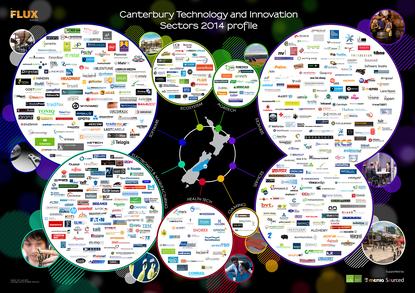Flux launches report on Canterbury tech sector
- 26 May, 2014 08:45

The Canterbury Technology and Innovation Sectors report, a document that profiles the technology ecosystem in Christchurch and the Canterbury region, has been launched by Flux, a new initiative dedicated to providing data and insights on the country's tech sector.
Founders of Flux Ben Reid, who is also director at consulting firm Memia and Jason Bishop, who is also director and GM of recruitment firm Sourced, state that the report is meant to bring together information on companies doing interesting technology work in the Canterbury region.
"Flux comes at the right moment as Christchurch moves into a recovery and growth phase - just to shine a light, in a single collated format on everything that is going on in the tech industry here with a view to attracting the best skilled resources and also potential investment," says Reid.
"It is really about getting a good handle on what is out there, so people working in it, can know and be proud of it, and enable the industry to move forward collectively as opposed to in silos," says Bishop.
Around 500 organisations are profiled in this initial report, which has been supported by the Canterbury Development Corporation (CDC). The companies have been divided into software and ICT, electronics and manufacturing, health tech, agri tech, gaming, services and ecosystem categories.
"The ecosystem category looks at the services companies, public sector, education and other industry bodies that are technically not technology companies. The big insight that we gained out of profiling the industry is the huge breath of the ecosystem that sits and works hand in hand with the tech firms, and how they contribute to the growth of the technology sector," says Reid.
The founders of Flux believe that the report can be a critical source of information for job seekers, venture capitalists, big IT firms that are looking to invest and even the education sector.
"Flux is very much around presenting in some ways a shop window to look at all the great companies that you could come and work for in Christchurch. When you are looking to move one of the considerations is if I move to an initial company, and that does not work out, who else am I going to work for? There is a real diversity in the Canterbury scene that we wanted to bring out," says Reid.
"The report's value to high schools and career advisors was one thing that we did not think about initially. There is a really big disconnect between what parents understand as being available for their children in the industry, and what the students themselves also understand. It is important for high school students to understand that there is a wide industry out there, with a lot of opportunity for work in the support sector, besides actual technology work," says Bishop.
The report is also meant to give information to venture capitals on the range of technology firms in the region, as well as bigger technology firms, who are looking to set up branch offices and are keen on doing so in areas of the country that offer a pool of talent they can tap into.
"The talent pool in Christchurch is growing and year-on-year it is going to get bigger. We are sitting on the sweet spot of the growth curve now where those changes are evident," says Bishop.
"My view is that the earthquake had a dampening effect on entrepreneurial and start-up activity in Christchurch for a few years. We are starting to see start-ups and entrepreneurs come up and the Christchurch culture is changing. The conservatives - who might have historically been associated with Christchurch is well out of the way now and we have a really adventurous set of people who are quite confident about the future," says Reid.
The report was put together by Flux researchers from publicly available information over a five month period.
Reid and Bishop assure that there will be periodic updates to the online version, and there is a plan to make the web version more interactive, while producing a printed version once a year.
A copy of the report can be downloaded here.
